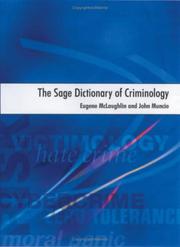| Listing 1 - 10 of 76 | << page >> |
Sort by
|

ISBN: 1412910854 9781412910859 1412910862 Year: 2006 Publisher: London ; Thousand Oaks ; New Delhi Sage Publications
Abstract | Keywords | Export | Availability | Bookmark
 Loading...
Loading...Choose an application
- Reference Manager
- EndNote
- RefWorks (Direct export to RefWorks)
Criminology --- Criminologie --- Dictionnaires
Book
Abstract | Keywords | Export | Availability | Bookmark
 Loading...
Loading...Choose an application
- Reference Manager
- EndNote
- RefWorks (Direct export to RefWorks)
Book
ISBN: 9781402048999 Year: 2006 Publisher: Dordrecht Springer Netherlands
Abstract | Keywords | Export | Availability | Bookmark
 Loading...
Loading...Choose an application
- Reference Manager
- EndNote
- RefWorks (Direct export to RefWorks)
Territorial borders are taking on a new significance, the implications of which are relatively unexplored within the discipline of criminology. This book presents the first systematic attempt to develop a critical criminology of the border and offers a unique treatment of the impact of globalisation and mobility. It focuses on borders and the significance of the activities which take place on and around them. For many the border is an everyday reality, a space in which to live, a land necessary to cross. For states the border space increasingly requires protection and defence; is at the centre of state ideology and performance; is the site for investing significant political and material resources, and is ultimately ungovernable. Providing a wealth of case material from Australia, Europe and North America, it is for students, academics, and practitioners working in the areas of criminology, migration, human geography, international law and politics, globalisation, sociology and cultural anthropology. "Borders, Mobility and Technologies of Control provides a model of criminological inquiry that is global in scope, constructionist in vision, and capable of combining the insights of dialogic and political-economic analyses into a holistic understanding of the growing conflict between nation-states and multitudes. This book is an important, new step forward for all those who approach criminology, not as an adjunct to state control, but as sociological inquiry in pursuit of human justice". Dr. Raymond Michalowski, Arizona Regents Professor, Northern Arizona University, USA "Borders, mobility and technologies of control is a radical exploration of new terrain in transnational and comparative criminology. Crossing disciplinary boundaries, this collection charts new forms of transgression and control in the borderlands, raising new theoretical questions and topics for research." Ben Bowling, Professor of Criminology & Criminal Justice, King's College, London
Digital
ISBN: 9781402048999 Year: 2006 Publisher: Dordrecht Springer
Abstract | Keywords | Export | Availability | Bookmark
 Loading...
Loading...Choose an application
- Reference Manager
- EndNote
- RefWorks (Direct export to RefWorks)
Book
Year: 2006 Publisher: la Charte
Abstract | Keywords | Export | Availability | Bookmark
 Loading...
Loading...Choose an application
- Reference Manager
- EndNote
- RefWorks (Direct export to RefWorks)
Book
ISBN: 9020406116 Year: 2006 Publisher: Amsterdam Antwerpen Veen [L.J.]
Abstract | Keywords | Export | Availability | Bookmark
 Loading...
Loading...Choose an application
- Reference Manager
- EndNote
- RefWorks (Direct export to RefWorks)
Criminologie --- Gerechtelijke geneeskunde --- Médecine légale
Book
ISBN: 9038209525 Year: 2006 Publisher: Gent Academia Press
Abstract | Keywords | Export | Availability | Bookmark
 Loading...
Loading...Choose an application
- Reference Manager
- EndNote
- RefWorks (Direct export to RefWorks)
In dit boek worden de drie belangrijkste biosociale studievelden besproken die van relevantie zijn voor de studie van normovertredend gedrag: de genetica, de psychofysiologie en de evolutiebiologie. Daarnaast worden ook beschouwingen geboden over de plaats van de biosociale criminologie in de criminologie als geheel (Bron: covertekst)
Criminologie --- Sociologie --- S20080193.JPG --- criminologie --- gedragsproblemen --- 343 --- 376 --- Criminologie. --- zenuwstelsel --- General ecology and biosociology --- Criminology. Victimology --- psychofysiologie --- genetica --- evolutieleer

ISBN: 0765803100 9780765803108 1412808561 9781412808569 Year: 2006 Publisher: New Brunswick, N.J. ; London : Transaction Publishers,
Abstract | Keywords | Export | Availability | Bookmark
 Loading...
Loading...Choose an application
- Reference Manager
- EndNote
- RefWorks (Direct export to RefWorks)
Criminology. --- Criminology --- Crime --- Social sciences --- Criminals --- Study and teaching --- CRIMINOLOGIE --- Criminologie --- THEORIES --- épistémologie
Book
ISBN: 9781402042447 Year: 2006 Publisher: Dordrecht Springer Netherlands
Abstract | Keywords | Export | Availability | Bookmark
 Loading...
Loading...Choose an application
- Reference Manager
- EndNote
- RefWorks (Direct export to RefWorks)
Crime prevention should be rational and should be based on the best possible evidence. Decision-makers should weigh heavily any available evidence on what works best. How can a program that has produced no discernable evidence of effectiveness, as shown through numerous evaluations, be considered for implementation? Unfortunately, this happens all the time. Evidence-based crime prevention attempts to overcome this and other obstacles by ensuring that the best available evidence is considered in any decision to implement a program designed to prevent crime. This book is about evidence-based crime prevention. A project of the Campbell Collaboration Crime and Justice Group, Preventing Crime brings together the leading scientific evidence on what works best for a wide range of interventions organized around four important domains in criminology: at-risk children, offenders, victims, and places. It is the first book to assess the effectiveness of criminological interventions using the most rigorous review methodology of the systematic review. It is an indispensable guide to the leading scientific evidence on what works best to prevent crime.
Social sciences (general) --- Criminology. Victimology --- sociale wetenschappen --- criminologie
Book
ISBN: 9781402049705 Year: 2006 Publisher: Dordrecht Springer Netherlands Imprint Springer
Abstract | Keywords | Export | Availability | Bookmark
 Loading...
Loading...Choose an application
- Reference Manager
- EndNote
- RefWorks (Direct export to RefWorks)
This comprehensive reference work presents an in-depth analysis on the juvenile justice systems of 19 different countries, both in EU-member states (old and new) and in the United States and Canada. The book is the result of research conducted by a group of outstanding scholars working in the field of juvenile justice. The book reflects a collective concern about trends in juvenile justice over the past two decades; trends that have begun to blur the difference between criminal and juvenile justice. The introduction highlights similarities and differences between the various systems, identifying three clusters of countries with a similar approach to juvenile justice. In particular, differences are found between the Anglo-Saxon countries, and continental Europe. The former have a more formal "justice" approach, with a strong emphasis on the accountability of juveniles, "just desert" principles, and retribution, while the latter still operate on a "welfare" philosophy. Two special systems, the Scottish Hearing system and the Scandinavian model, are presented as well.
Criminology. Victimology --- Criminal law. Criminal procedure --- strafrecht --- criminologie --- internationaal recht
| Listing 1 - 10 of 76 | << page >> |
Sort by
|

 Search
Search Feedback
Feedback About UniCat
About UniCat  Help
Help News
News